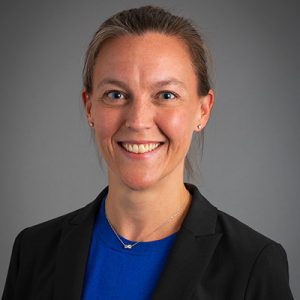
Following completion of their residency training, many surgeons may opt or may be required by their employer to obtain board certification in their area of specialty by sitting for written and oral examinations. But the format for the oral component of the exam often varies depending on the surgeon’s specialty. This raises the question of the benefits and drawbacks of these varying formats, and it’s a question that Brigitte Smith, MD, MHPE, the Department of Surgery’s new Vice Chair of Education and an Associate Professor in the Division of Vascular Surgery, will be looking into with a $70,000 grant she received from the American Board of Medical Specialties.
Smith will be specifically comparing the oral exams for board certification in three surgical fields – Plastic Surgery, Vascular Surgery, and Orthopaedic Surgery – and the differing ways these specialties approach the cases that surgeons are asked about during the oral exam.
“For some boards, the oral exam consists of hypothetical clinical cases that are written and approved by members of the certifying board – these are called standardized cases and this is the approach used by the Vascular Surgery Board,” explained Smith. “In contrast, the American Board of Orthopaedic Surgery requires candidates to submit a log of the cases they completed during their first year of unsupervised practice, and the board then selects a subset of these cases on which to query the candidate during the oral exam; this is called a case-biopsy or a “known cases” exam. Still other boards, like the American Board of Plastic Surgery, include both standardized cases and case-biopsies in their oral exam.”
Over the course of the 2025 board exam season, Smith and her collaborators plan to conduct interviews with candidates who sit for the board exams in vascular, orthopaedic, and plastic surgery to assess how the candidates prepared for their exam and their perceptions of the exam process and its impact on their clinical practice. They will also interview key stakeholders from the Vascular Surgery Board, the American Board of Orthopaedic Surgery, and the American Board of Plastic Surgery to explore perceptions of their board’s respective oral examination process. Finally, they plan to assess the relationship between cases that a candidate completed during their training and cases they completed during their first year of unsupervised practice to gain insight into the alignment of training and certification with early career practice patterns, as well as the behaviors of the candidate as they prepare for their oral exam.
“By providing an independent evaluation of a candidate’s clinical skills and competencies relative to their peers, board certification is intended to provide assurance to the public that the healthcare they receive is safe and of high quality,” said Smith. “Our findings will inform recommendations to optimize the oral exam format across different surgical specialties, which is a critical step in ensuring public safety. We’re incredibly thankful to the American Board of Medical Specialties for their support of this project.”